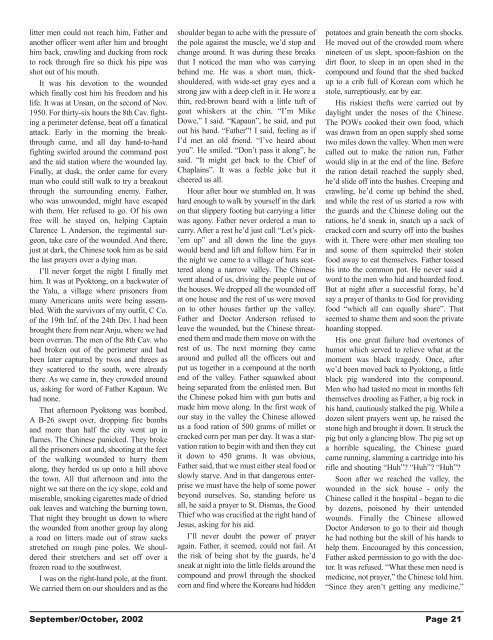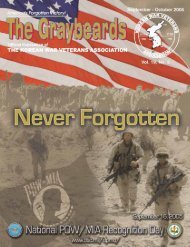The Graybeards – KWVA - Korean War Veterans Association
The Graybeards – KWVA - Korean War Veterans Association
The Graybeards – KWVA - Korean War Veterans Association
You also want an ePaper? Increase the reach of your titles
YUMPU automatically turns print PDFs into web optimized ePapers that Google loves.
litter men could not reach him, Father and<br />
another officer went after him and brought<br />
him back, crawling and ducking from rock<br />
to rock through fire so thick his pipe was<br />
shot out of his mouth.<br />
It was his devotion to the wounded<br />
which finally cost him his freedom and his<br />
life. It was at Unsan, on the second of Nov.<br />
1950. For thirty-six hours the 8th Cav. fighting<br />
a perimeter defense, beat off a fanatical<br />
attack. Early in the morning the breakthrough<br />
came, and all day hand-to-hand<br />
fighting swirled around the command post<br />
and the aid station where the wounded lay.<br />
Finally, at dusk, the order came for every<br />
man who could still walk to try a breakout<br />
through the surrounding enemy. Father,<br />
who was unwounded, might have escaped<br />
with them. Her refused to go. Of his own<br />
free will he stayed on, helping Captain<br />
Clarence L Anderson, the regimental surgeon,<br />
take care of the wounded. And there,<br />
just at dark, the Chinese took him as he said<br />
the last prayers over a dying man.<br />
I’ll never forget the night I finally met<br />
him. It was at Pyoktong, on a backwater of<br />
the Yalu, a village where prisoners from<br />
many Americans units were being assembled.<br />
With the survivors of my outfit, C Co.<br />
of the 19th Inf. of the 24th Div. I had been<br />
brought there from near Anju, where we had<br />
been overrun. <strong>The</strong> men of the 8th Cav. who<br />
had broken out of the perimeter and had<br />
been later captured by twos and threes as<br />
they scattered to the south, were already<br />
there. As we came in, they crowded around<br />
us, asking for word of Father Kapaun. We<br />
had none.<br />
That afternoon Pyoktong was bombed.<br />
A B-26 swept over, dropping fire bombs<br />
and more than half the city went up in<br />
flames. <strong>The</strong> Chinese panicked. <strong>The</strong>y broke<br />
all the prisoners out and, shooting at the feet<br />
of the walking wounded to hurry them<br />
along, they herded us up onto a hill above<br />
the town. All that afternoon and into the<br />
night we sat there on the icy slope, cold and<br />
miserable, smoking cigarettes made of dried<br />
oak leaves and watching the burning town.<br />
That night they brought us down to where<br />
the wounded from another group lay along<br />
a road on litters made out of straw sacks<br />
stretched on rough pine poles. We shouldered<br />
their stretchers and set off over a<br />
frozen road to the southwest.<br />
I was on the right-hand pole, at the front.<br />
We carried them on our shoulders and as the<br />
shoulder began to ache with the pressure of<br />
the pole against the muscle, we’d stop and<br />
change around. It was during these breaks<br />
that I noticed the man who was carrying<br />
behind me. He was a short man, thickshouldered,<br />
with wide-set gray eyes and a<br />
strong jaw with a deep cleft in it. He wore a<br />
thin, red-brown beard with a little tuft of<br />
goat whiskers at the chin. “I’m Mike<br />
Dowe,” I said. “Kapaun”, he said, and put<br />
out his hand. “Father”! I said, feeling as if<br />
I’d met an old friend. “I’ve heard about<br />
you”. He smiled. “Don’t pass it along”, he<br />
said. “It might get back to the Chief of<br />
Chaplains”. It was a feeble joke but it<br />
cheered us all.<br />
Hour after hour we stumbled on. It was<br />
hard enough to walk by yourself in the dark<br />
on that slippery footing but carrying a litter<br />
was agony. Father never ordered a man to<br />
carry. After a rest he’d just call “Let’s pick-<br />
’em up” and all down the line the guys<br />
would bend and lift and follow him. Far in<br />
the night we came to a village of huts scattered<br />
along a narrow valley. <strong>The</strong> Chinese<br />
went ahead of us, driving the people out of<br />
the houses. We dropped all the wounded off<br />
at one house and the rest of us were moved<br />
on to other houses farther up the valley.<br />
Father and Doctor Anderson refused to<br />
leave the wounded, but the Chinese threatened<br />
them and made them move on with the<br />
rest of us. <strong>The</strong> next morning they came<br />
around and pulled all the officers out and<br />
put us together in a compound at the north<br />
end of the valley. Father squawked about<br />
being separated from the enlisted men. But<br />
the Chinese poked him with gun butts and<br />
made him move along. In the first week of<br />
our stay in the valley the Chinese allowed<br />
us a food ration of 500 grams of millet or<br />
cracked corn per man per day. It was a starvation<br />
ration to begin with and then they cut<br />
it down to 450 grams. It was obvious,<br />
Father said, that we must either steal food or<br />
slowly starve. And in that dangerous enterprise<br />
we must have the help of some power<br />
beyond ourselves. So, standing before us<br />
all, he said a prayer to St. Dismas, the Good<br />
Thief who was crucified at the right hand of<br />
Jesus, asking for his aid.<br />
I’ll never doubt the power of prayer<br />
again. Father, it seemed, could not fail. At<br />
the risk of being shot by the guards, he’d<br />
sneak at night into the little fields around the<br />
compound and prowl through the shocked<br />
corn and find where the <strong>Korean</strong>s had hidden<br />
potatoes and grain beneath the corn shocks.<br />
He moved out of the crowded room where<br />
nineteen of us slept, spoon-fashion on the<br />
dirt floor, to sleep in an open shed in the<br />
compound and found that the shed backed<br />
up to a crib full of <strong>Korean</strong> corn which he<br />
stole, surreptiously, ear by ear.<br />
His riskiest thefts were carried out by<br />
daylight under the noses of the Chinese.<br />
<strong>The</strong> POWs cooked their own food, which<br />
was drawn from an open supply shed some<br />
two miles down the valley. When men were<br />
called out to make the ration run, Father<br />
would slip in at the end of the line. Before<br />
the ration detail reached the supply shed,<br />
he’d slide off into the bushes. Creeping and<br />
crawling, he’d come up behind the shed,<br />
and while the rest of us started a row with<br />
the guards and the Chinese doling out the<br />
rations, he’d sneak in, snatch up a sack of<br />
cracked corn and scurry off into the bushes<br />
with it. <strong>The</strong>re were other men stealing too<br />
and some of them squirreled their stolen<br />
food away to eat themselves. Father tossed<br />
his into the common pot. He never said a<br />
word to the men who hid and hoarded food.<br />
But at night after a successful foray, he’d<br />
say a prayer of thanks to God for providing<br />
food “which all can equally share”. That<br />
seemed to shame them and soon the private<br />
hoarding stopped.<br />
His one great failure had overtones of<br />
humor which served to relieve what at the<br />
moment was black tragedy. Once, after<br />
we’d been moved back to Pyoktong, a little<br />
black pig wandered into the compound.<br />
Men who had tasted no meat in months felt<br />
themselves drooling as Father, a big rock in<br />
his hand, cautiously stalked the pig. While a<br />
dozen silent prayers went up, he raised the<br />
stone high and brought it down. It struck the<br />
pig but only a glancing blow. <strong>The</strong> pig set up<br />
a horrible squealing, the Chinese guard<br />
came running, slamming a cartridge into his<br />
rifle and shouting “Huh”? “Huh”? “Huh”?<br />
Soon after we reached the valley, the<br />
wounded in the sick house - only the<br />
Chinese called it the hospital - began to die<br />
by dozens, poisoned by their untended<br />
wounds. Finally the Chinese allowed<br />
Doctor Anderson to go to their aid though<br />
he had nothing but the skill of his hands to<br />
help them. Encouraged by this concession,<br />
Father asked permission to go with the doctor.<br />
It was refused. “What these men need is<br />
medicine, not prayer,” the Chinese told him.<br />
“Since they aren’t getting any medicine,”<br />
September/October, 2002 Page 21

















